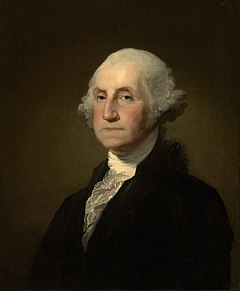
Back Washington's Birthday Afrikaans يوم الرؤساء Arabic Washington’s Birthday German Día de los Presidentes Spanish Presidenttien päivä Finnish Presidents Day French יום הולדתו של וושינגטון HE Ulang Tahun Washington ID Presidents' Day Italian ワシントン誕生日 Japanese
| Washington's Birthday Presidents' Day | |
|---|---|
 George Washington by Gilbert Stuart (1797) | |
| Official name | Varies by federal, state and city law |
| Observed by | United States |
| Type | Federal and most U.S. states and cities |
| Celebrations | Community and national celebrations |
| Date | third Monday in February |
| Frequency | Annual |
| First time | 1879 (as an official federal holiday) |
| Related to | Lincoln's Birthday |
Presidents' Day, officially Washington's Birthday at the federal governmental level, is a holiday in the United States celebrated on the third Monday of February. It is often celebrated to honor all those who served as presidents of the United States and, since 1879, has been the federal holiday honoring Founding Father George Washington, who led the Continental Army to victory in the American Revolutionary War, presided at the Constitutional Convention of 1787, and was the first U.S. president.[1]
The day is an official state holiday in most states under various names.[2] Depending upon the specific law, the state holiday may officially celebrate Washington alone, Washington and Abraham Lincoln, or some other combination of U.S. presidents (such as Washington and Thomas Jefferson, who was born in April).[2]
George Washington was born on February 22, 1732 (N.S.). Washington's Birthday was celebrated on this date from 1879 until 1970. To give federal employees a three-day weekend, in 1968 the Uniform Monday Holiday Act moved it to the third Monday in February.[3] The day soon became known as Presidents(') Day[4] (the presence and placement of the apostrophe varies) and provides an occasion to remember all the U.S. presidents, to honor Abraham Lincoln's and Washington's birthdays together, or any single president of choice.[2]
As many states and cities followed suit, some states that had been celebrating Lincoln's birthday on February 12 combined the two into Presidents Day. Lincoln led the nation through the American Civil War, preserved the Union, abolished slavery, bolstered the federal government, and modernized the U.S. economy.
- ^ "George Washington's Life". George Washington's Mount Vernon. Retrieved February 12, 2024.
- ^ a b c Strauss, Valerie (February 16, 2014). "Why Presidents' Day Is slightly strange". The Washington Post. Archived from the original on February 18, 2014. Retrieved February 17, 2014.
- ^ Cite error: The named reference
2manyCh1efswas invoked but never defined (see the help page). - ^ "Presidents' Day". govinfo.gov. February 12, 2021. Retrieved July 6, 2021.
© MMXXIII Rich X Search. We shall prevail. All rights reserved. Rich X Search